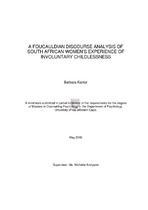| dc.contributor.advisor | Andipatin, Michelle | |
| dc.contributor.author | Kantor, Barbara | |
| dc.contributor.other | Dept. of Psychology | |
| dc.contributor.other | Faculty of Community and Health Sciences | |
| dc.date.accessioned | 2013-08-13T13:57:43Z | |
| dc.date.available | 2007/05/29 14:46 | |
| dc.date.available | 2007/05/29 | |
| dc.date.available | 2013-08-13T13:57:43Z | |
| dc.date.issued | 2006 | |
| dc.identifier.uri | http://hdl.handle.net/11394/1907 | |
| dc.description | Magister Psychologiae - MPsych | en_US |
| dc.description.abstract | As a consequence of positioning women within the dominant gender role of motherhood, the inability to have a child has exposed women, and more notably women in Africa, to extreme social consequences that often violate their human rights and lead to socio-economic disempowerment. The aim of this study was to consider prevailing discursive construction that position women within dominant ideologies that engender motherhood for women, and to explore how women make sense of and construct meaning regarding their experience when they desire but are not able to have a child. | en_US |
| dc.language.iso | en | en_US |
| dc.publisher | University of the Western Cape | en_US |
| dc.subject | Foucault | en_US |
| dc.subject | Michel | en_US |
| dc.subject | 1926-1984 | en_US |
| dc.subject | Childlessness - South Africa | en_US |
| dc.subject | Childlessness - South Africa - Psychological aspects | en_US |
| dc.subject | Infertility | en_US |
| dc.subject | Female - South Africa - Psychological aspects | en_US |
| dc.title | A Foucauldian discourse analysis of South African women's experience of involuntary childlessness | en_US |
| dc.type | Thesis | en_US |
| dc.rights.holder | University of the Western Cape | en_US |
| dc.description.country | South Africa | |

